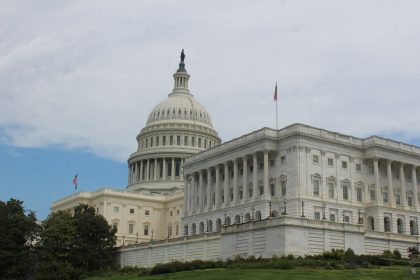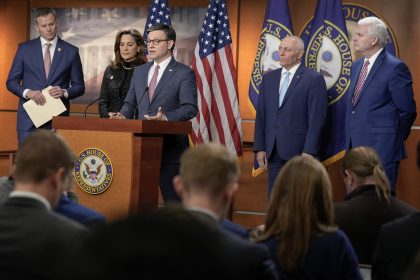Bipartisan Coronavirus Relief Package Hits Snags Over Details

WASHINGTON — After making a big splash last week and injecting a sense of optimism into long-delayed coronavirus relief talks, a bipartisan $908 billion plan is hung up over the specifics of aid to states and localities and liability protections for businesses.
Sources familiar with the talks said those two issues were the main sticking points holding up introduction of bill text, after a three-hour conference call on Sunday.
The $908 billion plan is being eyed by some as the baseline for a new aid package lawmakers plan to attach to an omnibus fiscal 2021 spending bill. A one-week stopgap measure to buy more time to write the massive package and vote on it is on tap this week.
Introduction of the plan’s framework by a bipartisan Senate group and members of the House’s Problem Solvers Caucus last week was followed by high-level endorsements to varying degrees.
President-elect Joe Biden endorsed it with little equivocation. Speaker Nancy Pelosi and Senate Minority Leader Charles E. Schumer said it could use “improvements,” including more money for state and local governments.
Senate Majority Leader Mitch McConnell initially dismissed the plan and unveiled his own $500 billion-plus version last week, but said he was willing to negotiate. Other GOP senators have since said they could back the bipartisan Problem Solvers plan, depending on details.
President Donald Trump hasn’t expressed a view, but said Saturday in Georgia that “I like the higher number rather than the lower number.”
On Monday, Trump top economic adviser Larry Kudlow told a “Washington Post Live” event that “I believe it is likely he will” sign a version of the bipartisan package. But he added: “It depends importantly on some of the policy details inside.”
Senate Republicans, business groups and the White House have insisted for months that any new aid bill include a liability shield if employers follow basic federal health safety guidelines. Democrats have resisted the effort, saying workers are putting their lives on the line in some cases and deserve the option of a court remedy if they get sick.
The bipartisan framework called for a “short-term” liability shield “with the purpose of giving states time to develop their own response,” according to a summary of the plan’s major provisions. But some GOP senators who were generally sympathetic to the larger package balked at that description; Thom Tillis of North Carolina, for instance, said he wanted something of “enduring value.”
The U.S. Chamber of Commerce on Monday morning weighed in with a letter imploring lawmakers to act on an aid package, with liability protections a critical piece.
“A liability safe harbor will protect small businesses and non-profits from being ruined by unfair litigation. The threat of a debilitating wave of lawsuits is clear,” U.S. Chamber Executive Vice President Neil Bradley wrote. “Personal injury lawyers are spending large sums of money advertising their services for COVID-19 lawsuits, a reliable barometer on tort litigation trends.”
Progressives have hit back at the prospect of any liability protections for employers. Sen. Bernie Sanders, I-Vt., said in a statement opposing the bipartisan plan that a liability shield would “provide a get-out-of-jail free card to companies that put the lives of their workers and customers at risk.”
House Majority Leader Steny H. Hoyer, D- Md., said a lawsuit moratorium could be reasonable, however. “Obviously we don’t want to change the rules of the game in terms of how people are compensated for wrongdoing of others,” Hoyer told MSNBC Friday. “But if it’s just a moratorium, that’s possibly something we could consider in my view.”
The overall aid plan attempts to find a middle ground on coronavirus relief between the roughly $500 billion pushed by Senate Republicans and $2.4 trillion backed by House Democrats. The package would provide $180 billion for unemployment benefits, $288 billion for small businesses and $160 billion in aid to state and local governments, among many other things.
It wasn’t immediately clear whether the holdup on state and local aid was the total dollar amount, the distribution formula or both.
Rep. Tom Reed, R- N.Y., has said the group negotiating the package wants to ensure that communities who didn’t receive an adequate slice of an initial $150 billion aid round in March is compensated this time around.
The March law set a 500,000 minimum population threshold for units of local government to receive pieces of their states’ allocations. Smaller cities and towns could receive some funding if they were part of larger counties, for example, but the lack of direct aid created bottlenecks that local officials said were unfair and sometimes cut them out completely.
In House Democrats’ $2.4 trillion package that chamber passed in October, they included $436 billion for state, local, tribal and territorial governments. Of that figure, nearly 55% would have been allocated directly to states and the District of Columbia based on their share of unemployed workers.
About 41% would go to localities, evenly divided between municipalities and counties. The money for counties would be distributed based on population, while 70% of the money for cities would go to those with a population of at least 50,000, and the rest to municipalities under that threshold.
The rest of the funding, $19 billion, would have been evenly divided between tribes and territories.
“I think we’ll get there,” said Sen. Mark Warner, D- Va., a member of the bipartisan group, in a CNN interview Sunday. “I think we may have to go through a few more days of drama.”
Meanwhile talks on the broader year-end package continued over the weekend, as the two parties traded offers and counteroffers. The latest ball is in Republicans’ court, reviewing an offer Democrats sent over Sunday night, according to sources familiar with the discussions.
Current stopgap funding is set to run dry Friday. But congressional leaders plan to introduce another stopgap that would extend funding until Dec. 18. The House plans to vote on the one-week bill on Wednesday, Hoyer said.
Among the unresolved issues were the Trump administration’s $2 billion request for border wall construction and how to account for about $12.5 billion in veterans health care spending, mostly to help them receive treatment in urgent care and other private clinics outside of the VA system.
Democrats and Senate Republicans want to exempt the veterans money from statutory spending limits to free up more funding for other nondefense programs. But House Minority Leader Kevin McCarthy has opposed the exemption and the White House has expressed concerns about it.
Negotiators were also hoping to attach tax provisions to the omnibus measure. Those could include making businesses expenses deductible even if they are financed through the Paycheck Protection Program, which provides forgivable loans. They could also include changes to the employee retention tax credit and the extension of various expiring tax breaks, according to a source familiar with the talks.
And a rescue package for faltering union pension plans was also under discussion, the source said. About 124 pension plans with some 1.3 million participants are projecting they will run out of money by 2040. Democrats have pushed for what would be a roughly $60 billion taxpayer rescue. Republicans instead have offered benefit cuts, insurance premium hikes and rising company contributions.
___
Paul M. Krawzak and Niels Lesniewski contributed to this report.
___
(c)2020 CQ-Roll Call, Inc., All Rights Reserved
Distributed by Tribune Content Agency, LLC
























